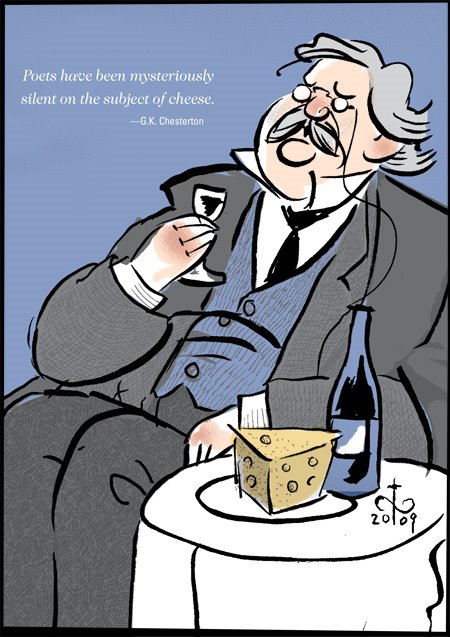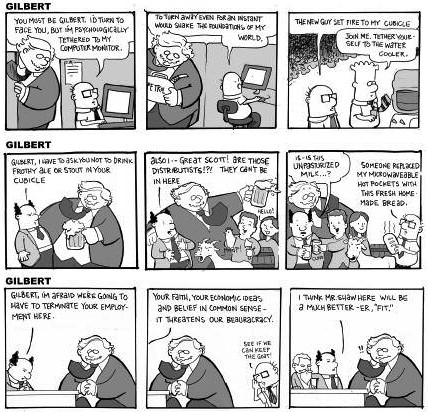Chesterton
About Andrew Cusack
 Writer, web designer, etc.; born in New York; educated in Argentina, Scotland, and South Africa; now based in London.
Writer, web designer, etc.; born in New York; educated in Argentina, Scotland, and South Africa; now based in London. read more
News
Blogs
Reviews & Periodicals
Arts & Design
World
France
Mitteleuropa
Knickerbockers
Argentina
The Levant
Africa
Cape of Good Hope
Netherlands
Scandinavia
Québec
India
Muscovy
Germany
Academica
Of poets & cheese

FOR G. K CHESTERTON to claim that poets have been “silent” on the subject of cheese is not quite accurate, as, while they have by no means been particularly vocal, one does occasionally stumble upon cheesely verse. I only cite one such example from The Farmer’s Boy of Robert Bloomfield (n. 1766, m. 1823).
Begins their work, begins the simple lay ;
The full-charged udder yields its willing streams,
While Mary sings some lover’s amorous dreams ;
And crouching Giles beneath a neighbouring tree
Tugs o’er his pail, and chants with equal glee.
Whose hat with tatter’d brim, of nap so bare,
From the cow’s side purloins a coat of hair,
A mottled ensign of his harmless trade,
An unambitious, peaceable cockade.
As unambitious too that cheerful aid
The mistress yields beside her rosy maid ;
With joy she views her plenteous reeking store,
And bears a brimmer to the dairy door ;
Her cows dissmiss’d, the luscious mead to roam,
Till eve again recall them loaded home,
And now the Dairy claims her choicest care,
And half her household find employment there ;
Slow rolls the churn, its load of clogging cream
At once forgoes its quality and name ;
From knotty particles first floating wide
Congealing butter’s dash’d from side to side ;
Streams of new milk through flowing coolers stray,
And snow-white curd abounds, and wholesome whey.
Due north th’ unglazed windows, cold and clear,
For warming sunbeams are unwelcome here.
Brisk goes the work beneath each busy hand,
And Giles must trudge, whoever gives command ;
A Gibeonite, that serves them all by turns ;
He drains the pump, from him the faggot burns ;
From him the noisy hogs demand their food ;
While at his heels run many a chirping brood,
Or down his path in expectation stand,
With equal claims upon his strewing hand.
Thus wastes the morn, till each with pleasure sees
The bustle o’er, and press’d the new-made cheese.
Some reading notes
ROBERT O’BRIEN, IN a deliberately provocative gesture, once said in conversation that he pitied America for not having any literature. Preposterous! was my natural response. We have Chaucer and Shakespeare and Mallory and Dickens! Yes, you Britons have them too, but you will have to share, I’m afraid. To try to separate America from the English greats is the equivalent of forbidding a son from taking pride in his family’s long and illustrious history. He may not be the eldest male descendant, but does this mean he must deny his heritage? Of course not. Naturally, like the Scots and the Irish we have our own subset of English literature — Mark Twain, F. Scott Fitzgerald, Flannery O’Connor, and J.D. Salinger come to mind — and there are even a few crossovers such as Henry James and T.S. Eliot.
The idea of doing a degree in English or in any literature has always seemed unattractive to me, though I by no means advocate the abolition of English departments. Perhaps it’s because I rarely found English a compelling subject in high school, though I did have some extremely talented teachers: The P (as she is known), as well as Mr. Leahy. I am one of those no doubt millions who wishes he had actually read all those books he supposedly read for class at school. I did enjoy Sophocles, and Homer too, but I did not really get into Flaubert (I intend to revisit him). Crime and Punishment I soaked up at the time, but have since forgotten.
How tiresome it must be, as a formal student of literature, to be forced to answer questions about works you have read. I wonder if there should be two tracks within universities: one for gentlemen, who merely seek to learn, and another for budding academics, who need proof they’ve learnt something. Some books have taken years (and multiple readings) to truly sink in, so it seems preposterous to arbitrarily require a succinct series of answers to examination questions at the end of a term.
Idea-driven novels seem foolish to me as well. In New York, I knew a Frenchman, not much older than myself, who (I discovered) was in the midst of writing a novel. Intrigued, I asked him one day what the novel is about. He paused for a few moments, sat back, and slowly tapped his finger thrice on the table in thought, and said “Stratification”. Well! Call me a simpleton but I would have preferred “a guy, a girl, a plot, an affair, schoolmates, a day, a week . . .” anything, but “stratification”?
Well, he is writing in French, and if you are going to write an idea-driven novel, it’s probably best to do it in French.
What have I been reading lately? A few months ago I finished Erskine Childers’ The Riddle of the Sands — an absolutely cracking book. It was late in the African summer, and I was perched appropriately on the sands of Kogelbaai — one of the most stunning beaches in the Cape. What’s more, it was a weekday afternoon, and so the strand was abandoned but for our small party, so we sat, read, napped, explored the rocks, and enjoyed the beauty of our surrounds. Another cracking read was Chesterton’s The Man Who Was Thursday. The author subtitled his book “A Nightmare” and it had moments of utter fear and dread, but also, being Chesterton, moments of ridiculous farce and hilarity: a fascinating insight into the mind and mentality of a jovial and saintly man.
H.V. Morton, the man who convinced me to come to South Africa with his In Search of South Africa, showed me the Eternal City with A Traveller in Rome, and I am so tantalizingly close to finishing that magnificent work of Thomas Pakenham (now Lord Longford, since the death of his father), The Boer War. Pakenham is an historian beyond compare. I began Kristin Lavransdatter to great enjoyment, but am waiting till my return to New York to complete it. I started The Prisoner of Zenda while travelling in Namibia and finished it on Pentecost weekend. Boswell’s Johnson I found an excellent little india-paper edition of in a tiny back-alley shop in Wells last year (we ran into Michael Alexander on the street) and I’ve been pottering through it bit-by-bit. On the recommendation of Stefan Beck I picked up J.P. Donleavy’s The Ginger Man but found it obsessively vulgar and, worse, boring, so returned it to the goodly people at the Universiteit se biblioteek.
I still have out from the library a handsome, handy, small German printing of Legends of the Rhine (translated into English). I like small books, books you can easily fit in the pocket of a field coat and whip out at a moment’s notice. At a reception in a New York gallery some time ago, I learned from John Derbyshire that the determining factor of the old Penguins’ size was that it would fit in the front coat pocket of a British Army officer. The new size of Penguins are much too large to carry about as emergency reading, which makes me very glad that they’ve brought back the older, smaller size.
Penguins aside, I still prefer those shorter, fatter editions printed on thinnest india-paper. Jocelyn, my cook at university, gave me such a copy of The Pickwick Papers (inscribed “To Andrew Cusack — one of the most Pickwickian individuals I have ever met”) for my birthday one year, and it is one of the dearest editions I own. Does anyone print on india-paper anymore? I suspect not, and more’s the pity. Michael Wharton (better known as Peter Simple) noted shortly before his death how difficult it was becoming to obtain sheets of foolscap in London. Thus passes the glories of the world…
Dilbert on Gilbert

A recent Gilbert magazine featured G.K. himself interpolated into the popular Dilbert comic strip by Scott Adams. The text is quite small so I shall reproduce it below: (more…)
Chesterton Remembered
SIR: Your article on G.K. (This England, Summer 1986) brought back a happy personal memory of that great and kindly man. It was 1930 in Rome, where I was a pupil at a “finishing school” – in this case an English convent. G.K. sometimes came to visit our Reverend Mother; we knew him by sight and, once seen, who could forget the huge man in the big black cloak?
Part of our “finishing” process was to be taken round the museums and galleries of the Eternal City. One day we were being shepherded through the Vatican Museum. My friend and I somehow managed to get separated from the rest of our party and in one of the galleries whom should we see but Mr. G.K. Chesterton. He was about to leave so we followed him down the stairs in the hope of being able to get his autograph. At the foot of the stairs he turned. “As we had such young legs”, he said, “could one of us be so kind as to run back to the gallery where he had left his cloak, and would the other see if she could find him a carrozza [a cab, lit. ‘carriage’]?” We needed no second bidding. I raced back up the stairs, found the familiar black cloak where he had left it and triumphantly returned it to its owner. Meanwhile my friend had found a vacant carrozza. G.K. thanked us both, climbed into the carrozza and drove off. In the excitement we had forgotten about the autographs! Next day a letter arrived at our convent. He addressed it to “The Young Ladies suffering education at the convent at No. 10 Via Boncompagni.” Inside was a sheet full of auto-graphs and a little poem.
For you alone did I desire,
Who brought the prophet’s mantle down
And called his chariot of fire!
I have the precious autograph still and what a strange Chinese-looking affair it is!
— MRS. L. RIPLEY, BRIGHTON
Search
Instagram: @andcusack
Click here for my Instagram photos.Most Recent Posts
- Burns Tower April 19, 2024
- Patrick in Parliament March 18, 2024
- Articles of Note: 13 March 2024 March 13, 2024
- Cambridge March 9, 2024
- Taken on Trust March 4, 2024
Most Recent Comments
Book Wishlist
Monthly Archives
Categories


